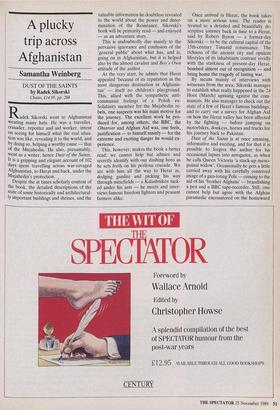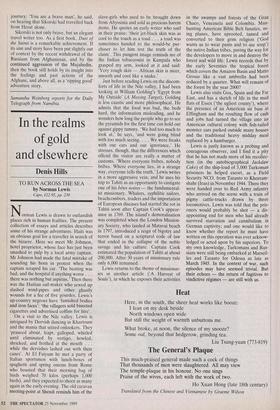A plucky trip across Afghanistan
Samantha Weinberg
DUST OF THE SAINTS by Radek Sikorski
Chatto, £14.95, pp. 288
adek Sikorski went to Afghanistan wearing many hats. He was a traveller, crusader, reporter and aid worker, intent on seeing for himself what the real situa- tion was like, revealing it to the world, and by doing so, helping a worthy cause — that of the Mujahedin. He also, presumably, went as a writer, hence Dust of the Saints. It is a gripping and elegant account of 102 days spent travelling across war-ravaged Afghanistan, to Herat and back, under the Mujahedin's protection.
Despite the at times scholarly content of the book, the detailed descriptions of the state of some historically and architectural- ly important buildings and shrines, and the valuable information he doubtless revealed to the world about the power and deter- mination of the Resistance, Sikorski's book will be primarily read — and enjoyed — as an adventure story.
This is undoubtedly due mainly to the pervasive ignorance and confusion of the `general public' about what has, and is, going on in Afghanistan, but it is helped also by the almost cavalier and Boy's Own attitude of the author.
At the very start, he admits that Herat appealed 'because of its reputation as the most dangerous destination in Afghanis- tan' — itself no children's playground. This, allied with the sympathetic anti- communist feelings of a Polish ex- Solidarity member for the Mujahedin re- bels, one suspects was his main motive for the journey. The excellent work he pro- duced for, among others, the BBC, the Observer and Afghan Aid was, one feels, justification — to himself mainly — for the extreme and exciting danger he would ex- perience. This, however, makes the book a better read; we cannot help but admire and secretly identify with our dashing hero as he sets forth on his perilous crusade. We are with him all the way to Herat as, dodging gunfire and picking his way through minefields — a Kalashnikov tuck- ed under his arm — he meets and inter- views famous freedom fighters and peasant farmers alike.
Once arrived in Herat, the book takes on a more serious tone. The reader is treated to a detailed and beautifully de- scriptive journey back in time to a Herat, said by Robert Byron — a former-day Sikorski — to be the cultural capital of the 15th-century Timurid renaissance. The richness of the ancient city and opulent lifestyles of its inhabitants contrast vividly with the starkness of present-day Herat, bombed almost out of recognition — and bring home the tragedy of lasting war.
By means mainly of interviews with witnesses from the area, Sikorski manages to establish what really happened in the 24 Hoot (March) uprising against the com- munists. He also manages to check out the state of a few of Herat's famous buildings, and to carry out a survey for Afghan Aid on how the Herat valley has been affected by the fighting — before jumping on motorbikes, donkeys, horses and trucks for his journey back to Pakistan.
Dust of the Saints is at once amusing, informative and exciting, and for that it is possible to forgive the author for his occasional lapses into arrogance, as when he calls Queen Victoria 'a stuck-up meno- pausal widow'. Occasionally he gets a little carried away with his carefully contrived image of a gun-toting Pole — coming to the aid of his 'brother Afghans' — brandishing a pen and a BBC tape-recorder. Still, one cannot help but agree with the Afghan paramedic encountered on the homeward
journey: 'You are a brave man', he said, on hearing that Sikorski had travelled back from Herat alone.
Sikorski is not only brave, but an elegant travel writer too. As a first book, Dust of the Saints is a remarkable achievement. If its aim and story have been put slightly out of context by the recent withdrawal of the Russians from Afghanistan, and by the continued aggression of the Mujahedin, then the book still holds by its insight into the feelings and past actions of the Afghans, and above all, as a 'ripping good' adventure story.
Samantha Weinberg reports for the Daily Telegraph from Namibia.











































































 Previous page
Previous page